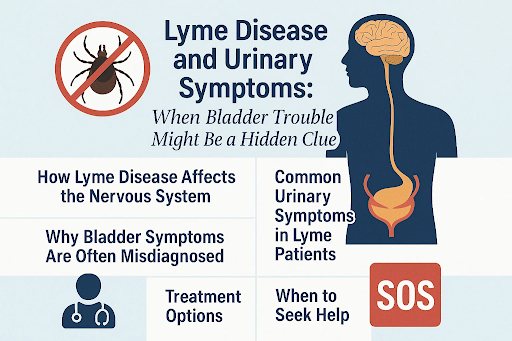
Lyme can affect the nervous system, immunity, and often there are signs of something deeper that doctors overlook. For many individuals, Lyme disease and co- infections, urinary symptoms are quite confusing and frustrating pieces of this puzzle.
In this article, we will dive in together to learn how Lyme disease can cause urinary issues, why they are often misdiagnosed by the doctors.
If you are experiencing baffling symptoms, this article might help you find the missing clue you have been searching for.
How Lyme Disease Affects the Nervous System
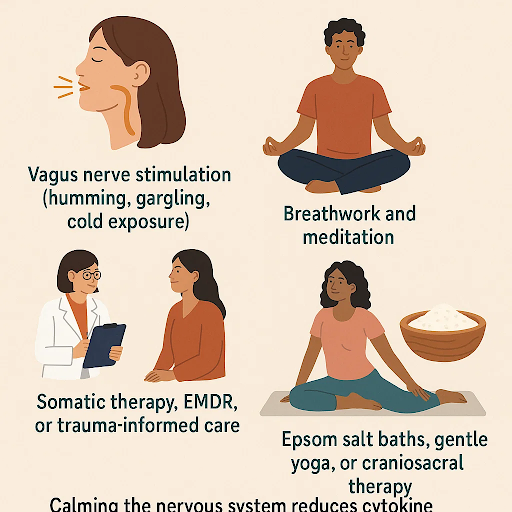
When Lyme disease transmits to the nervous system, it is called neuroborreliosis. It impacts the central nervous system and peripheral nervous system.
Why?
- Lyme bacteria crosses the blood- brain barrier.
- It also triggers the inflammatory condition in the brain and nerves
- Confuses the immune system which gives rise to the chronic symptoms.
Lyme can actually damage or inflame the areas such as:
- Sacral Nerves: These nerves control the contraction of bladder and pelvic floor muscles.
- Vagus and Pelvic Nerves: Vagus and pelvic nerves dysfunctioning can disrupt autonomic function. This can lead to retention or urgency.
- Brainstem and Spinal Cord: Neuroinflammation can disrupt bladder controlling mechanism.
Summing up this, when Lyme affects the nervous system– even if your body wants to function properly, it will not be able to.
Common Urinary Symptoms in Lyme Patients
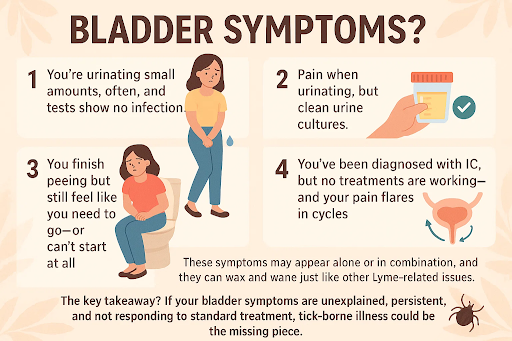
Bladder related symptoms are often not understood or brushed off– but for individuals with Lyme disease. Let us break down the common urinary symptoms linked to Lyme and other co- infections.
- Recurring Urination: If you are suffering from recurrent urination issues, this can be just more than a hydration issue. Lyme disease inflames the nerves responsible for bladder signaling which results in the constant urge to pee.
- Urgency or Lack of control: The “can’t hold it” feeling may lead to leakage and lack of control. This occurs when Lyme affects the muscles controlling the bladder function.
- Dysuria (pain while urinating): A sharp, burning sensation while peeing is often misunderstood as for Urinary Tract Infection (UTI). But with Lyme around– the tests related to UTI might as well keep coming back negative, leaving one with unanswered doubts and concerns. The wall of the bladder is irritated from the chronic or at present Lyme infection which ultimately mimics the UTI symptoms.
- Incomplete Emptying: This can be primarily because of the sacral nerve or spinal cord improper functioning. These nerves control the ability of the bladder to undergo function like contraction and relaxation.
- Interstitial Cystitis (IC): The symptoms of interstitial cystitis like symptoms with no clear cause. Symptoms such as pelvic pain, bladder pressure, and so on mimic the IC symptoms.
Why Bladder Symptoms Are Often Misdiagnosed
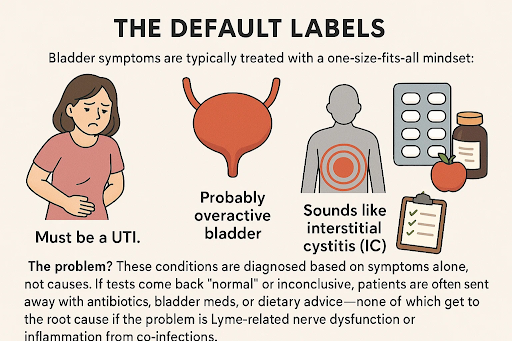
- Misdiagnosis: The urinary bladder symptoms are often pointed in the directions and conditions such as UTIs, overactive bladder or IC. If an individual is suffering from Lyme, the real issue is missed. There are these persistent default labels (as discussed in the infographic) which are presented.
- Lack of Lyme Awareness: In the urology world, most urologists are not trained enough to identify Lyme disease or its effects on the nervous system.
- Role of Medical Gaslighting: The most painful part is definitely not the bladder symptoms. It is the fact that no one believes. Because of the test results are so inconclusive or the failure of treatments, individuals are told–
- “Oh, it is definitely psychological”
- “It is due to your age.”
- “It is just in your head.”
Treatment Options
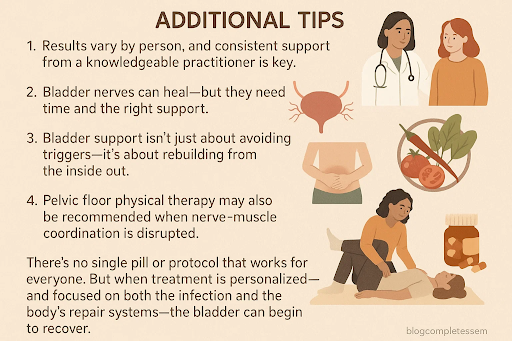
Relief is definitely possible. Treating the root cause (Lyme disease) will possibly aid in healing of these urinary related conditions. These signs are of deep systemic imbalances and disruptions. There are treatment strategies that support the healing by controlling the symptoms.
- Antibiotic and Herbal Approaches: Oral or IV antibiotics are prescribed to target the bacteria Borrelia burgdorferi. Herbal approaches aid in a more enhanced way if we combine the antibiotic and herbal approaches.
- Nerve Dysfunction Repair: The nerves are quite inflamed or damaged thereby restoring this connection can be helpful. Tools such as Low-dose naltrexone (LDN), Alpha-lipoic acid & B-complex vitamins, Methylation and mitochondrial support can definitely aid.
- Bladder Healing: Soothing the bladder lining and minimizing the pain signals can help. Strategies should be well adopted to calm the irritation, for mucosal lining support, to minimize inflammatory conditions, and so on.
Managing Co- infections: Other tick- borne infections contributing to bladder and nerve symptoms should be managed effectively.
When to Seek Help- SOS mode
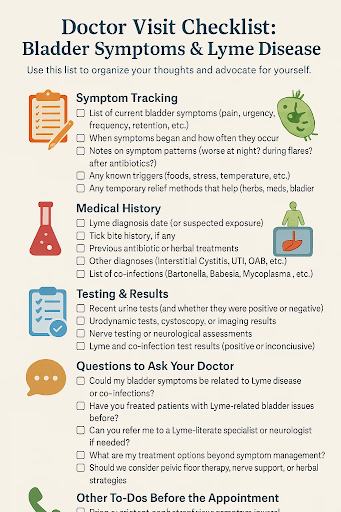
Emergency Symptoms:
- Urinary Retention
- Lower or pelvic abdominal pain with a full bladder
- High fever and chills
- Hematuria
- Loss of bowel control movement
- Rapid worsening of incontinence
2. These symptoms may point to a bladder infection, kidney involvement, or worsening neuroinflammation—and should not be ignored.
Seek for practitioners who:
- Validate your thoughts and conditions with symptoms
- Understanding autonomic dysfunctioning and neurogenic bladder
- Collaborate with neurologists, integrative providers, or Lyme- specialists
- Take time to listen even if the test results are “normal.”
Conclusion
- Urinary problems are not always due to infection or aging– it can be due to neurological dysfunction or improper function.
- Even if the tests are “normal” but you still feel like there is something wrong– trust your gut instinct.
- Whether you are dealing with pain, urgency, retention problems– know that you are not alone. Healing will take time, but you always have answers. It is time to listen and be heard.
What’s Next for You?
Ready to explore a more complete path to recovery?
References
- Chancellor MB, McGinnis DE, Shenot PJ, Kiilholma P, Hirsch IH. Urinary dysfunction in Lyme disease. J Urol. 1993;149(1):26–30. doi:10.1016/S0022-5347(17)35989-X.
- Biesiada G, Czepiel J, Leśniak MR, Garlicki A, Mach T. Lyme disease: review. Arch Med Sci. 2012;8:978–982. doi: 10.5114/aoms.2012.30948. [DOI] [PMC free article] [PubMed] [Google Scholar]
- Ackermann R, Rehse-Kupper B, Gollmer E, Schmidt R. Chronic neurologic manifestations of erythema migrans borreliosis. Ann N Y Acad Sci. 1988;539:16–23. doi: 10.1111/j.1749-6632.1988.tb31834.x. [DOI] [PubMed] [Google Scholar]
- Chancellor MB, Dato VM, Yang JY. Lyme disease presents as urinary retention. J Urol. 1990;143:1223–1224. doi: 10.1016/s0022-5347(17)40231-x. [DOI] [PubMed] [Google Scholar]
- Kim MH, Kim WC, Park DS. Neurogenic bladder in lyme disease. Int Neurourol J. 2012;16:201–204. doi: 10.5213/inj.2012.16.4.201. [DOI] [PMC free article] [PubMed] [Google Scholar]








